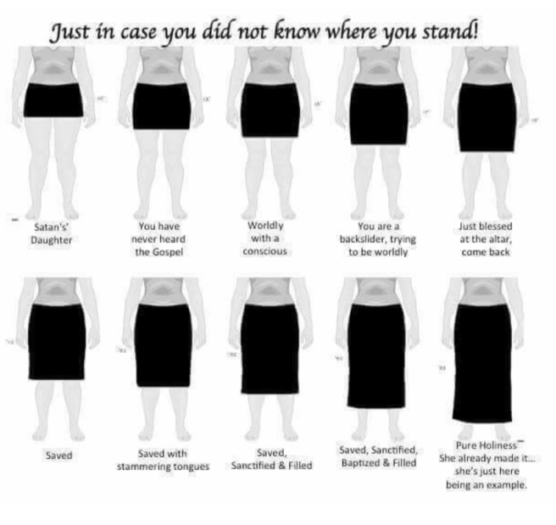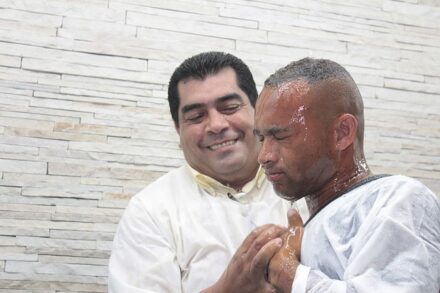One pastor wrote in response to the Twitter feed #55thingsonlychristianwomenhear. He emphasized a handful of tweets that said women were valued, and then went into a complaint against tweets that Christian women had heard about being in leadership or wearing certain clothes. He apparently didn’t read the feed itself, which included things like:
“‘The ultimate healing would be if you two were married’– said by the mom of my rapist.”
*meeting my friend’s baby* “Don’t worry this will happen for you soon.”
“It’s not your job to read the bible to our children. Their spiritual education is my job said the man.”
“If you had to pick, you’d rather follow the call of God on your life than get MARRIED? I don’t understand!”
“I recently got my PhD, after congratulations everyone talks about me needing to get a husband.”
“The nerve of women to complain. And, PUBLICLY! A woman’s job is to keep the peace, at her own expense.”
“‘The definition of biblical womanhood is marriage & motherhood.’ So single/childless women are unbiblical?”
“When you heard many sermons on how women submit to husbands but 0 on how husbands lay down their life for wife.”
“I know we’ve been friends 20 yrs & the divorce wasn’t your fault but I can’t have a divorcee near my husband.”
“Ambition isn’t godly.”
“Did you come to seminary to find a husband?”
“You need to let a man provide for you.” Me: “I’m single, so if I did that I wouldn’t eat…”
“Said to male/female youth: ‘Every woman has an inherent desire for children. If she doesn’t, something’s wrong.'”
“The church: ‘The dental hygienist deserved to be fired” (boss lusted).’
“You must be mistaken! Your hubby is a GOOD Christian, You can’t be a battered wife!”
“Well, no, he shouldn’t have done that, but as his wife you have to submit.”
The above are just a sampling. They were not addressed in the response.
Now, as for what was, there was a lot on clothes and dressing modestly. It happens that I’ve known this man. It happens that he’s known me ever since I left an organization that taught women should only wear dresses or skirts that come at least 6″ below the knee, should always wear sleeves below the elbow, should not let their collarbones show. He is very familiar with this group… and disagrees with them. Yet what he says in this response about clothes sounds so like them. And then he says: “How a man views a woman who is dressed immodestly is different than the way a woman perceives it.”
Wait. Do all men view women who dress immodestly “differently?” What is immodest? Isn’t what is considered modest at least partly cultural? (Consider what some tribal people in Africa consider modest compared to what is modest in America, or what is considered modest on a beach compared to what is considered modest in an office.) And do men really think “differently” about women who breach whatever their definition of modesty is? In my experience, they do only or mainly if they are told they should or if it is often called to their attention.
He ends with this statement:
“Perhaps you need to learn to “count it all joy, my brothers [and sisters], when you meet trials of various kinds” (James 1:2). And you need to do that first before taking your grievances to Facebook or Twitter. Slandering the church is demonic. Watch out that you’re not like the wicked servant who beats his fellow servants in Matthew 24:45-51. God will cut you into pieces and throw you out with the hypocrites.”
Count it all joy. Unless he is saying that “trials” are dressing “modestly” and staying out of leadership in the church, he has read some of the other tweets. Count it all joy. When your parents tell you they wish you’d marry your rapist? When you are told that you should go to a Beth Moore study and do a craft while the men discuss theology? When you’re told a man’s just being a man when he stalks you at church, so deal with it? When you’re told that you should stop wanting to be married but should get married and, if you’re single, that your life is on hold because women’s highest calling is to marry and have kids? Hmm…
Our grievances have been taken to churches. For years. And they have been ignored, in large part, in too many churches. But now he warns us not to take these grievances to Facebook or Twitter. Don’t discuss them. Don’t bring them into the open. “Slandering the church is demonic.” Where is that in the Bible? Who is beating his fellow servants? There is NOTHING wrong with saying that something being ignored by the church shouldn’t be.
In that way, how is 55 Things so much different than Luther’s 95 Theses? Yes, he responded to different things. But he called out the church for teachings that were harmful to people and were unscriptural. Yes, the man who wrote the response would say that some of the responses were scriptural. But surely not all. Surely not the ones I listed. And as for “God [cutting] you into pieces”… that is not in Matthew 25. I have not seen that in the Bible at all, though I have heard similar fear tactics used to silence those who would stand for right. I’ll take my chances. I’ll stand.
As Kelly Ladd Bishop said in her blog post: “The hashtag took some criticism from Christians who claim that it reflects poorly on the church and will turn people away. But that’s no different than covering up abuse because it reflects poorly on the abuser. These quotes are the reality for so many women in the church. So if it is reflecting accurately and turning people away, then perhaps it’s time for the church to listen to what the women are saying and do better.”











